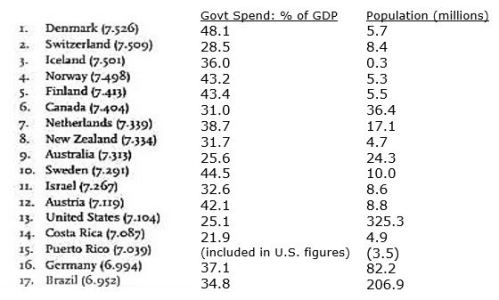Attributable at times to Thomas Paine, Thomas Jefferson, John Adams, Napoleon’s valet, the quote has no identifiable father, for one obvious reason: It’s wrong.
According to the World Happiness Report—there is such a thing at the U.N.—happiness, like gross national product, can be (crudely) measured by survey. Here is what the people in the number-crunching business had to say about their methodology:
“So how do the researchers come up with this list? The process is actually rather simple, as the Index’s website explains: “The rankings are based on answers to the main life evaluation question asked in the poll. This is called the Cantril ladder: it asks respondents to think of a ladder, with the best possible life for them being a 10, and the worst possible life being a 0. They are then asked to rate their own current lives on that 0 to 10 scale.”
Simple enough. Here are the top 17 happiest nations on Earth.

We use percentage of GDP as a proxy for expenditures per capita, which figures are not readily available. The U.S. and Brazil are the only “happy” countries among the 16 most heavily populated nations to make the list.
For the record, the least happy 10 countries (out of 53 measured) were:

What are we to infer from all these numbers? It seems fairly obvious that, in general, people living in smaller, colder countries are more likely to be happy than those living in large and/or tropical ones. And, ignoring Timor-Leste and Eritria (too small, too much civil war), it would appear not to be a coincidence that of the 10 countries spending the greatest percentage of GDP on government services, six are found in the list of happiest countries. The U.S. and Germany are the only countries on the happiness list that also appear on the list of top countries by military expenditures, where the U.S. spends more than the next eight countries combined. Finally, we must confront the fact that, deducting defense expenditures from total government spending means the U.S. effectively spends even less per capita on “happiness” (i.e., health and welfare) than the happier countries on the list.
All of which is to say that the liberal worldview, so thoroughly embraced in the Scandinavian countries, with high tax rates and a comprehensive set of “free” government services, appears to make people happier than a more conservative approach that seeks to minimize expenditures on social welfare programs in order to fund what could be characterized as a grossly over-inflated defense budget.
Which is where we came in on this movie. It is not true that that government which governs least governs best. What appears to be true is that government which effectively secures the lives and wellbeing of its citizens governs best. In the United States, the country that invented Rugged Individualism, the “don’t tread on me” spirit which turns sparsely populated western and Midwestern states red will resist government of any size, shape or flavor until the roads start falling to pieces and it takes 25 minutes for an ambulance to arrive at one’s house, long after the heart attack victim has gone cold.
And so it’s true in America as it is across the globe. People, and nations comprised of large numbers of them, can be counted on not to recognize which things lead to happiness and which things lead to deprivation and misery. The “poverty amidst plenty” dichotomy growing worse in the United States each year, courtesy in large part to the Republican politicians on Capitol Hill, is obscene and needs, finally, to be addressed in a meaningful way. For leadership on this issue, the only informed voice in Washington is that of Bernie Sanders. “Republican leadership” has become an oxymoron. According to most Republicans, who embrace the quote, government, by definition, is bad, and it is this warped perception from the right that is driving efforts to repeal Obamacare. (I will resist the temptation to take this last argument to its “logical extreme,” which is that Republicans tend to believe that PEOPLE are bad.)
After eight years devoted to failing efforts to do so, the Republican party is finally in a position to repeal Obamacare. They do not have the balls or brains it takes to draw up an improved replacement plan, leading me to believe they will take us through a healthcare crisis measured in years, to emerge with pretty much what we have now. The 800-pound gorilla in the room, that no Republican wants to acknowledge, is the obvious solution for healthcare: Medicare for everyone. A single payer system that negotiates prices for durable and non-durable medical goods on behalf of the government payer and is operated by private insurance companies. Universal medical coverage for every U.S. citizen. No more senior citizens having to choose between medicine and food. Higher taxes will be needed to pay for it, but the people living in the countries that do it this way seem not to mind. The stock prices of the medical device and drug companies will decline.
As usual, the Republicans, including their plutocratic and incredibly unprepared President taking office on January 20, are hell-bent to proceed in exactly the wrong direction. Lots of Trump voters, poor people in red states, will be paying the price. With the Democratic party being leaderless and discredited, this is their saving grace: The Republicans will be seen as running things badly, with an unstable president and a Congress generally loathed by most Americans. Good luck with that.
Leave a comment